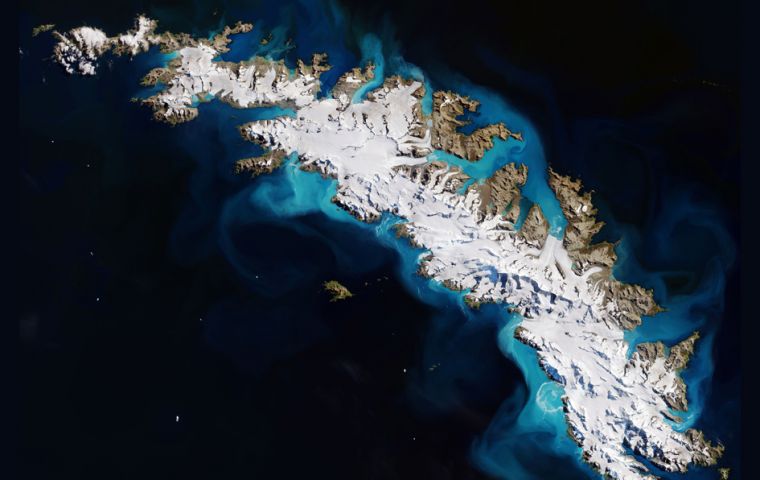MercoPress. South Atlantic News Agency
South Georgia Island seen from Copernicus Sentinel-2 orbit
 This image, which was captured on 22 February 2018, is also featured on the Earth from Space video program
This image, which was captured on 22 February 2018, is also featured on the Earth from Space video program The Copernicus Sentinel-2 mission takes us over the island of South Georgia. Linked with the South Sandwich Islands to form a British Overseas Territory, this southern Atlantic island is a haven for a vast array of wildlife.
Around five million seals call the islands home, as well as 65 million birds of 30 different species. Migrating whales and various fish species populate the surrounding waters and there is a large penguin population.
First discovered by Captain James Cook in 1775, there is no permanent human population on the island, due to its remote location and inhospitable environment. Nevertheless, a British Antarctic Survey research station operates in the capital, King Edward Point, in the island's centre. This is a centre for applied fisheries research, while on Bird Island, lying off the north-west tip of South Georgia, scientists and support staff focus on research into bird and seal biology.
As can be seen clearly in the image, South Georgia is mostly covered in snow. Its polar climate gives it short and very cold summers, and long, freezing and overcast winters. The rugged landscapes of the island are often said to leave visitors in awe, with two mountain ranges dominating - the Allardyce towards the middle of the island and Salvesen in the south.
In 2012 the UK Government designated South Georgia as one of the world's largest sustainable use Marine Protected Areas. Significant investment has also been made in fisheries management and scientific research, as well as targeted conservation efforts to help protect the albatross. South Georgia is home to the Wandering Albatross - the largest flying bird species in the world.
Sentinel-2 is a two-satellite mission to supply the coverage and data delivery needed for Europe's Copernicus program. The mission's frequent revisits over the same area and high spatial resolution allow changes in inland water bodies and the coastal environment to be closely monitored.




Top Comments
Disclaimer & comment rules-

-

Read all commentsStill “claimed” by Argentina - nobody knows under what basis, aside from the egotistic, since it was discovered by Captain Cook and was never in the Spanish sphere of influence.
Dec 23rd, 2018 - 12:14 pm 0The fact remains that uti possidetis juris fails to square properly with the legal establishment of non-Hispanic states in the New World, as well as with the more recently evolved principle of decolonization and self-determination. Furthermore, save for the Latin American states, succession from the original Spanish rights has neither commanded widespread respect nor attracted international acceptance, either in practice or in principle. The dearth of contemporary legal appreciation for uti possidetis juris strongly suggests that it contributes only a modicum, if any, legal support to either Argentina's or Chile's assertion to valid title over claims in the Southern Ocean or Antarctica. In short, consideration of intertemporal law and factual conditions, especially the extent to which the territorial sovereignty of Spain was actually manifest in the Antarctic casts serious doubts about the legal propriety or validity of the uti possidetis argument today. (79) ('Antarctica and the Law of The Sea,' Joyner C,* Nijhoff, M Publishers, p59-60, 1992, quoting, 'Conflict of Sovereignties in Antarctica,' Yearbook of World Affairs, Daniel J, p 262-66, 1949; 'The American Antarctic,' American Journal of International Law,' p603, Hayton R.D., 1956; and 'Antarctic Law and Politics,' Auburn, F.M. P50, pub C Hurst 1982).
Dec 23rd, 2018 - 07:54 pm 0*Associate Professor of Political Science and Member of the School of International Affairs, George Washington University, Washington D.C.
To believe that the Falkland Islands and the territories in the Southern Ocean belong to Argentina because of the inheritance is incorrect. Falklands – Argentina's Inheritance Problem (1 pg): https://www.academia.edu/35194694/Falklands_Argentinas_Inheritance_Problem
Commenting for this story is now closed.
If you have a Facebook account, become a fan and comment on our Facebook Page!